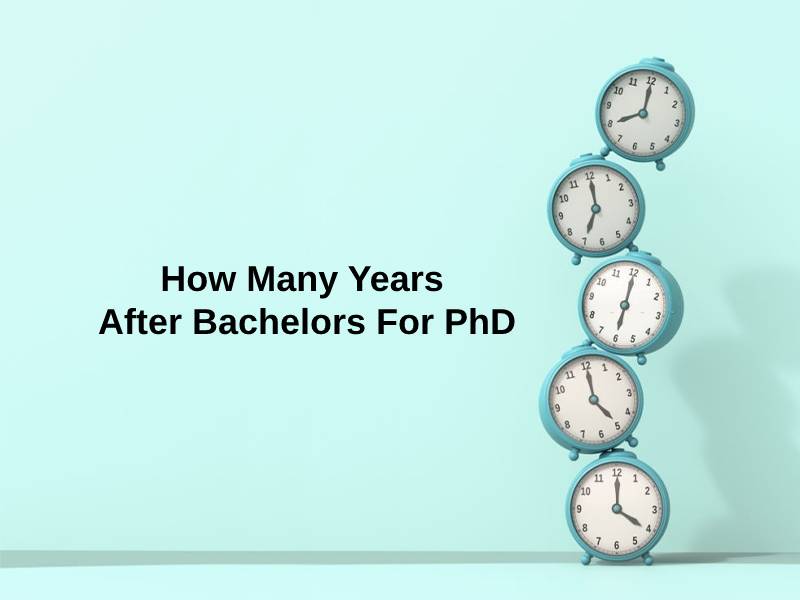Exact Answer: More than 3 years
A Bachelor’s Degree is a college graduation degree. It is awarded to a student who has successfully cleared the graduation level of his or her education at the college with honors in the subject of his or her selection. It is essentially the first qualifying and basic degree awarded to any academically-inclined college student.
A Ph.D. is an academic abbreviation that stands for the Doctor of Philosophy degree. In most countries around the world, holders of this academic degree are qualified to teach the subject they have mastered at the university or college level. In other words, it allows the degree holder to become a professor in a reputed institution.

How Many Years After Bachelors For PhD (And Why)?
Acquiring a Ph.D. after a Bachelor’s Degree can be a long and arduous process. There is no set timeline between the two degrees as such. The flexibility of institutional timeframes and course requirements in each educational establishment also affects the minimum time period between the two degrees. Theoretically, one can acquire a Ph.D. decades after securing a Bachelor’s Degree.
Generally, if a student opts for a regular educational course of action after completing his Bachelor’s Degree, then he should enroll in a Master’s program. Most such programs are one or two years long. After this, he can opt for an M.Phil. Degree. Most such courses span a year or two. After this arduous process, one can apply for a Ph.D. that takes longer than 3 years to be completed.
When following this long process, acquiring a Ph.D. after Bachelor’s will take around 7 to 8 years. On the other hand, if he manages to find an institution that offers Ph.D. courses without a Master’s Degree then the time frame can be truncated. It will then be reduced to at least 4 years after securing a Bachelor’s Degree.
It is impossible to acquire a Ph.D. 3 years after a Bachelor’s Degree because of the difficulty level of the course curriculum. The Ph.D. research work is so arduous that most students are unable to complete it within 3 years of time. Moreover, some students may continue their research work for more than 5 to 6 years. This further adds to the time gap between their Bachelor’s Degree and Ph.D.
This timeframe is also affected by the particular educational policies of countries around the world. In the case of some countries like India, a special national qualification exam -NET- makes one eligible for Ph.D. enrollment without an M.Phil. Degree.

In Summary:
| Educational Route Followed | Time Gap |
| With Master’s Degree and M.Phil. | 7 to 8 years |
| Without Master’s Degree and M.Phil. | At least 4 years |
| With Gap Years | More than 3 years |
| Without Gap Years | 7 years |
Why Does A PhD Take So Long After Bachelors?
Any Ph.D. research is extremely complicated and must be diligently conducted over a period of certain years. Thus, it is almost impossible to acquire a Ph.D. Degree within 3 years of acquiring a Bachelor’s Degree.
A Master’s Degree is considered necessary when one wants to pursue a Ph.D. In most countries, this course spans up to 2 years. This period helps the candidate attain in-depth knowledge about the subject he or she is studying. Similarly, an M.Phil Degree may be essential for some institutions. In such cases, one cannot be enrolled without a Master’s in Philosophy.
Similarly, sometimes it may take an individual longer to acquire a Ph.D. Degree if the candidate decides to take some time off after the Bachelor’s Degree course. In theory, one can acquire a Ph.D. at any point in time after a B.A. or B.Sc. Degree. This would mean that the time taken to complete a Ph.D. will be longer than others.

Some students can finish their Ph.D. within 4 years, while some others may take decades to finally acquire it. The volume of research included in the specific topic chosen for a Ph.D. also affects this time frame. One needs to gather all relevant forms of knowledge and materials before he or she can enroll and complete a Ph.D. Degree.
If an individual happens to drop out of an ongoing Ph.D. course, he or she may need to reenroll and begin the program from scratch again. This may take a few years. In such cases, a Ph.D. is attained almost a decade after a Bachelor’s Degree.
Conclusion
Acquiring a Bachelor’s degree is considered to be a relatively easy feat of achievement for students. It is granted within 3 to 4 years of enrolling into an institution. However, acquiring a Ph.D. is an equally challenging and long process.
Generally, a Ph.D. cannot be acquired within 3 years of completing a B.A. or B.Sc. course because the degree curriculum is difficult. Most students take longer to complete their Ph.D. if one opts for a Master’s Degree or an M.Phil. course in between Bachelor’s and Ph.D., then the process will be much longer than 3 years. Most students complete their Ph.D. within 7 to 8 years of finishing their Bachelor’s degree course.
References
- https://link.springer.com/article/10.1057/palgrave.hep.8300050
- https://pubs.aeaweb.org/doi/pdf/10.1257/000282806777212134

This article reaffirms the challenging journey to acquiring a PhD. It’s accurate and well written.
I’m sure this will be helpful for those considering pursuing a Ph.D.
It’s refreshing to see such extensive detail in one article.
This was enlightening. The article effectively highlights the complexities involved in pursuing a Ph.D.
I didn’t realize the nuances of obtaining a Ph.D. until reading this post.
Great article, but the journey doesn’t suit everyone.
Interesting insights into the journey of obtaining a Ph.D. I enjoyed reading this.
Very insightful and well presented information. It captures the essence of the journey.
This article was informative and I found the information pretty useful. Having this kind of content is always welcome and appreciated.
It’s a great read, I enjoyed reading it.
Userful information, but not everyone chooses this academic path.
This content is a testament to the extensive effort required to obtain a Ph.D.
A challenging path, but worth it for some.
Appreciated the attention to detail in the explanation.
The article effectively describes the intricate process of pursuing a Ph.D. It’s quite enlightening.
This will surely resonate with those seeking higher education.
Intense path, but with great rewards for those committed.
The article provides an in-depth understanding of the time and effort involved in acquiring a Ph.D.
The detailed information will be beneficial to those considering the academic path.
I found this article to be a comprehensive guide for those interested in higher education.
I appreciate the detailed information. Obtaining a Ph.D. is definitely a demanding process that requires a lot of time and dedication.
The path to a Ph.D. is undeniably rigorous, and this article does justice to its complexities.